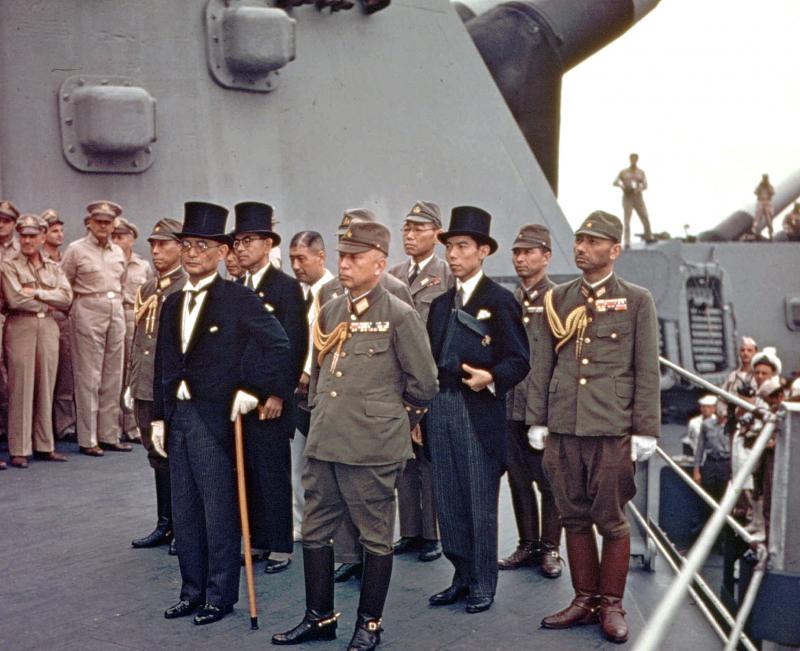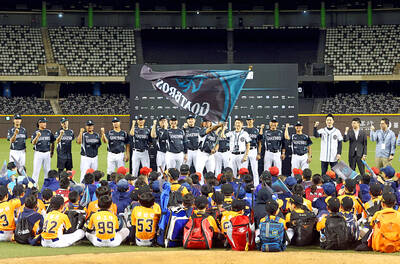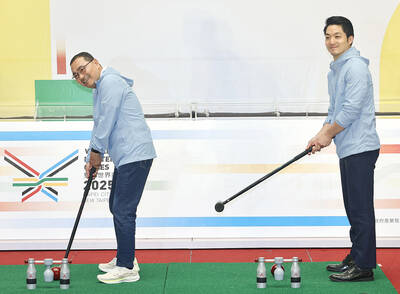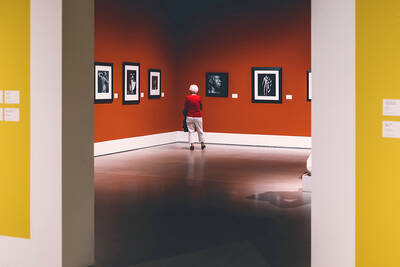The verb “decapitate” combines the Latin words de (off) and caput (head). It means “to cut the head off,” and came into English in the 1610s, by way of the 14th century French word decapiter. The noun form is “decapitation.”
The word “capitation” also exists, although it doesn’t mean to place the head back on the body once it has been removed. It means “the counting of heads” for the purposes of levying a tax, and dates back to the 1610s.
In the early 15th century, the root caput came to be associated with the main, principal, chief or dominant item of its kind. It wasn’t until the 1660s, however, that the word “capital” was first recorded to refer to the main city of a country, being the official seat of government.

Photo: AP 照片:美聯社
The upper case first letter of a sentence came to be called the capital letter — appearing as it does at the “head” of the sentence — in around the 14th century.
The Latin capitulum (chapter) leads to the idea of “to draw up in heads or chapters” and therefore that of arranging terms and conditions in an agreement. In the 1640s this was narrowed down to arranging terms of surrender, giving us the modern verb “to capitulate,” meaning to surrender having negotiated terms, or by extension, to “cease resisting.”
(Paul Cooper, Taipei Times)
動詞「decapitate」結合了拉丁字「de」(脫離、切斷、掉落)和「caput」(頭部),是斷頭的意思。該字源自於十四世紀的法文字「decapiter」,約在一六一○年代進入英語系統,名詞是「decapitation」。
在英語中也有「capitation」這個字,不過並不是把砍斷的頭再接回身體的意思,而是徵稅時按人頭計算之意,該字亦可回朔自一六一○年代。
在十五世紀初,「caput」這個字根開始和主要的、首要的、為首的、支配的這類之概念產生關聯。然而,直到一六六○年代,才有關於「capital」這個字首次用來代表一國首都的記錄,也就是政府的正式所在地。
而句子的第一個字母要大寫,自十四世紀左右起也叫「capital letter」(大寫字母)——顯然是因為它是一個句子的「開頭」。
拉丁字「capitulum」(章節)則引申為起草契約標題或章節、安排協議條款及條件。而到了一六四○年代,其字義便限縮為安排投降條款,因此而有了「capitulate」一字的現代字義︰依協商好的條件投降,並另外衍生出停止反抗的意思。
(台北時報張聖恩譯)

A: The 2025 World Masters Games will begin on May 17 and run until May 30. B: World Masters Games? A: It’s a quadrennial multi-sport event for people over 30, which will be jointly held by Taipei and New Taipei City. B: Cool, maybe we can go cheer for all the athletes from home and abroad. A: There will be an athletes’ parade in downtown Taipei prior to the opening ceremony on Saturday. Let’s go then. A: 2025雙北世界壯年運動會5月17日開幕,持續至5月30日閉幕。 B: 世壯運? A: 這是四年一度、以30歲以上青壯年為主的運動會,本屆是由台北市和新北市共同舉辦。 B: 好酷喔,我們去幫來自國內外的選手們加油吧! A: 週六在台北市區會有選手遊行,之後是開幕典禮,我們去看吧。 (By Eddy Chang, Taipei Times/台北時報張迪)

A: Where will the 35 sports of the 2025 World Masters Games be held? B: Apart from Taipei and New Taipei City, some games will take place in Yilan County, Taoyuan County, and Hsinchu County and City. A: The news says about 25,000 people, including many celebrities and sports stars, have already registered for the games. B: Even Taipei Mayor Chiang Wan-an, who is 47, registered for softball and squash. New Taipei Mayor Hou You-yi, who is 68, also registered for table tennis. A: And it will be the largest sports event ever in Taiwan’s history. How exciting. A:

Computex, Asia’s biggest electronics conference, kicked off Monday in Taipei, and as in years past drew industry chieftains from Nvidia Corp.’s Jensen Huang and Qualcomm Inc.’s Cristiano Amon to Young Liu of Foxconn, which makes the bulk of the world’s iPhones and Nvidia servers. But while last year’s event was a celebration of the post-ChatGPT AI boom, executives this time are likely grappling with the uncertainty of the Trump administration’s effort to reshape the global trade order — disrupting a decades-old model for tech manufacturing. This year’s exhibition will of course feature the hardware required to bring artificial intelligence to life.

Have you ever wondered who decides what we see in a museum or how one artwork seamlessly connects to the next? Behind every thoughtfully arranged gallery space stands a curator, a skilled professional who combines art and storytelling to craft meaningful experiences. The term “curator” originates from the Latin word cura, meaning “to care.” Curators were originally caretakers of museum collections, but over time, their role has grown to include a broad range of responsibilities that extend far beyond preservation. Today, curators manage, organize and interpret collections in cultural institutions like museums and libraries. They research, acquire and catalogue